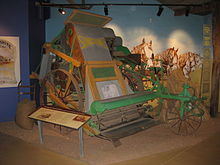- Hugh Victor McKay
-
Hugh Victor McKay (H. V. McKay) CBE, (21 August 1865 - 21 May 1926) was an Australian inventor of the Sunshine Harvester and industrialist.
Contents
Early life
McKay was born the fifth child of a family of twelve near Drummartin, between Elmore and Raywood, Victoria. His parents were protestant immigrants from Monaghan, Ireland and arrived in Victoria in 1852. His father, Nathaniel McKay had been a stonemason and then a miner, before becoming a farmer around the end of 1865. Hugh attended Drummartin Primary School, and received some education from his father Nathaniel, before returning to the farm at 13. In 1883 he read about Californian Combine harvester. With his brother John and his father he built a prototype stripper-harvester by January 1885 and patented the Sunshine Harvester on 24 March 1885,[1] which revolutionised wheat harvesting and sold throughout the world. Although he lost a Victorian Government prize for the first working stripper-harvester to James Morrow in 1885,[2] he successfully commercialised his invention, and had them built under contract in Melbourne and Bendigo. In 1888, he opened a working factory in Ballarat. In 1891 he married Sarah Irene Graves.
He later acquired the Braybrook Implement Works, and renamed it the Sunshine Harvester Works after his Sunshine Harvester. Subsequently in 1907, the residents of Braybrook Junction voted to rename the suburb Sunshine. The plant was expanded rapidly and at its peak employed nearly 3000 workers. It was the largest factory in Australia and as an example of entrepreneurship has probably not been surpassed in Australia.
Harvester judgement
A dispute between McKay and the unions representing the Sunshine workers was heard before the Commonwealth Court of Conciliation and Arbitration in Melbourne between 7 October 1907 and 8 November 1907. H. B. Higgins heard evidence from employees and their wives. In the Harvester Judgement, he obliged McKay to pay his employees a wage that guaranteed them a standard of living which was reasonable for "a human being in a civilised community", regardless of his capacity to pay. McKay successfully appealed this judgement, but it became the basis of the basic wage, which dominated Australian economic life for the next 60 to 80 years.
Later life
McKay died at Rupertswood, a mansion in Sunbury, Victoria (notable as the birthplace of the Ashes) on 21 May 1926 and was survived by his wife, a daughter and two sons. His will was valued at £1,448,146; a codicil vested the income from 100,000 shares in the H. V. McKay Charitable Trust, chaired by George Swinburne. The trust's aims are to improve country life and aid charity in Sunshine.[1]
Honours
He was made a Commander of the Order of the British Empire in 1919.
References
- ^ a b Lack, John. "McKay, Hugh Victor (1865 - 1926)". Australian Dictionary of Biography. Australian National University. http://www.adb.online.anu.edu.au/biogs/A100286b.htm. Retrieved 2007-03-12.
- ^ Parsons, George. "Morrow, James (1843 - 1910)". Australian Dictionary of Biography. Australian National University. http://www.adb.online.anu.edu.au/biogs/A050344b.htm. Retrieved 2007-03-12.
Serle, Percival (1949). "McKay, Hugh Victor". Dictionary of Australian Biography. Sydney: Angus and Robertson. http://gutenberg.net.au/dictbiog/0-dict-biogMc.html#mckay1.
Categories:- 1865 births
- 1926 deaths
- Australian inventors
- People from Victoria (Australia)
- Commanders of the Order of the British Empire
Wikimedia Foundation. 2010.

